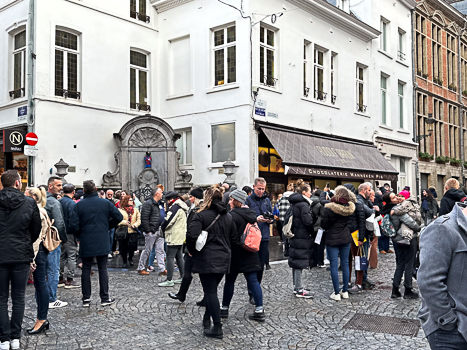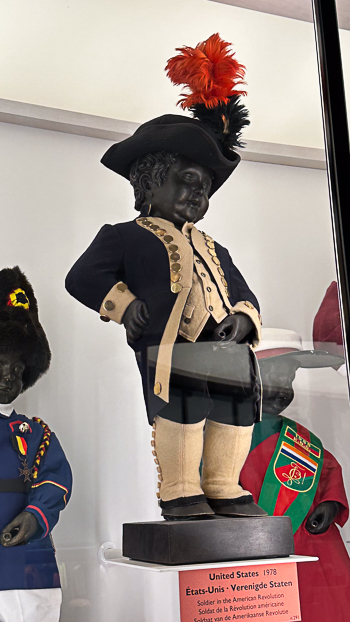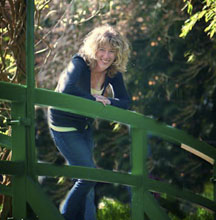BRUGES
Where’s Belgium?
During my senior year at Sprague High School, my family hosted a French-speaking American Field Service student named Lucie from outside Montreal. That introduced me to other AFS kids from around the world, including some from Belgium.
Here’s what I recall about Belgium from that time:
- Nobody knows where it is.
- Most Belgians speak several languages but nobody’s quite sure which ones.
- They make and export excellent chocolates.
I’d say these points have changed little since then. What did inspire me to add Belgium to this trip was the recommendation of our late friend Jeff, whom we miss terribly. After he and Lori visited Bruges several years ago, he urged us to go, too.
“You can swing up there and eat chocolate,” Jeff explained, knowing us well.
So today we flew from Barcelona to Brussels.
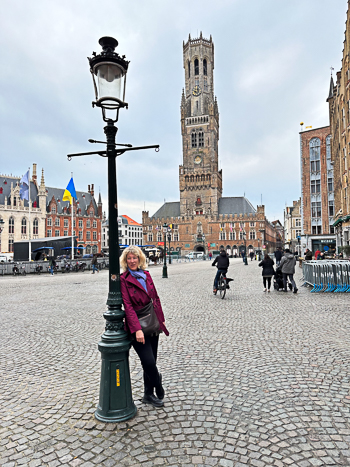
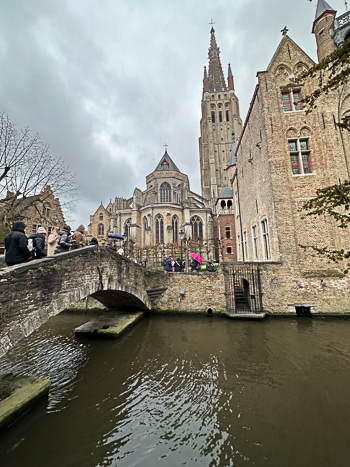
New Friends
Isabel scheduled our airport taxi for us since Barcelona outlaws Uber and Lyft because it’s a leftie city and the cab drivers just won’t have it.
Our Brussels Airlines flight went smoothly despite not offering anything free to drink, not even tap water. You have to pay three euros for bottled water, something the FAA would never allow back home.
To get from the airport to Bruges we hired a driver, an amiable guy who dreams of visiting the Grand Canyon in the United States and the Big Five animals in Africa. He loves American muscle cars from the 1970s and 80s, like Mustang and Camaro, and he and his girlfriend have nine small dogs. They want more.
Our driver learned Dutch as a child then compulsory French starting around 5th grade for two years. After that students can choose to continue with French or pick up another language. Most select English, he said, in order to understand American television and movies.
He prefers Americans as customers but says he hates Austrians. He claims that all his colleagues consider Americans the nicest by far. (Good to hear but wonder if has to do with our customary tipping?)
I asked if he transports European Union diplomats in Brussels but he said another company has the corner on that market. He’d like to try someday, however, because you get to drive with a blue light, pass all stops, and have roads closed for you.
I asked how the pandemic went for him and he said that everyone had to stay home with only their household members. If caught with anyone else, you earned a 100 euro fine.
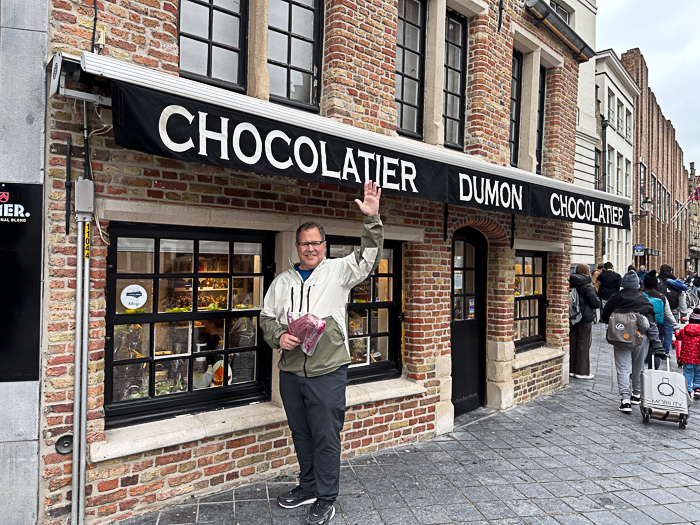
Chocolate Hotel
I booked a boutique hotel in Bruges that would normally blow our budget, but not so much in this pre-season. We splurged on their fancy breakfast buffet and had the place nearly to ourselves.
Belgium is rightly famous for their chocolates, and our morning buffet included all manner of chocolate pieces and nuggets, some of which we quietly deposited into our pockets. Later I discovered cocoa residue on my room key card which may or may not have caused its malfunction the following day.
Ever cheerful, our hotel staff exists to help. At our Barcelona apartment, we had to fend for ourselves and keep keys in hand to avoid the very real threat of getting trapped in the vestibule between apartments. Here in Bruges, our hotel concierge would provide emergency assistance if we required a nail file, and eagerly so.
Room service just knocked on our door for turn-down service. They offered fresh towels and two small boxes of chocolate, a night-cap here in Belgium, apparently.
Jeff would be so pleased.
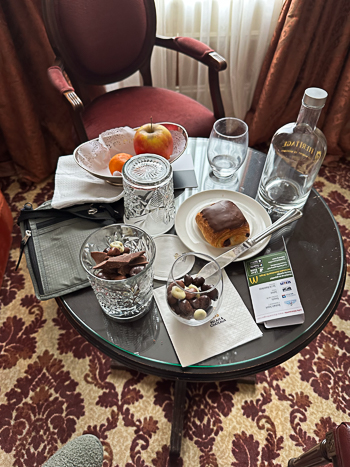
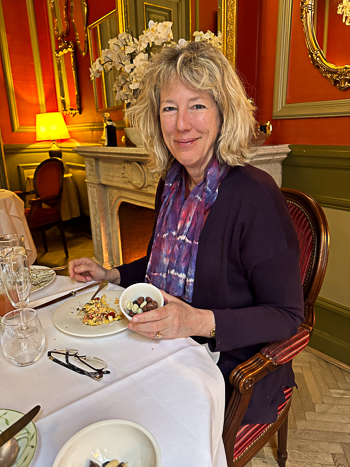
Fries and Hospitality
We love Bruge’s Gothic architecture and old town where workers sustain a dry sense of humor. You might think they’d grow cynical with the masses of tourists, but they just roll with it. When you exit a museum, they chirp an earnest, “Thank you for the visit!”
We accidentally entered the Renaissance Hall instead of the Basilica of the Holy Blood. The desk clerk showed us where to go by abandoning his post, crossing the lobby, walking us back outside and pointing out the church.
At the Market Square we purchased french fries, another Belgian favorite, from one of two iconic food stands at the base of the Bell Tower. Like other Belgian fry places, they supply all sorts of toppings. Jim chose the traditional mayonnaise and I picked Andalusian, a sweet/spicy sauce. They fry the potatoes once before running them through a second round when you order, resulting in a hot, crispy delight.
While our potatoes sizzled, I chatted with the young Nepalese man working the family business. I asked him which toppings he favored. He said none; his family is vegetarian and they cook the fries in beef oil.
I asked him how many languages he spoke. Though born in Belgium, he speaks Nepalese at home. He acquired Dutch at school, then French. He later learned English in order to understand movies before picking up sufficient Spanish and other languages to take food orders. His family bought their business two years ago.
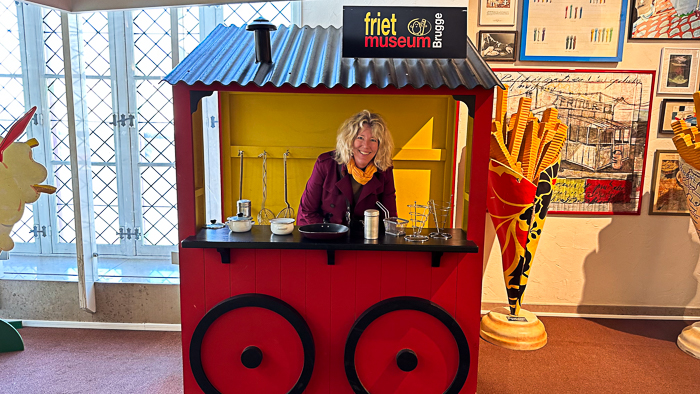
International Love
With their fresh salads, cheese croquettes, and lasagna bolognese, we returned to a restaurant called Délice to sample their shrimp scampi—but only after I asked the proprietor if the crustaceans still had their heads attached. Jim gets spooked when fish eyes stare back at him, something you’ll regularly find in Europe. The owner assured us the shrimp would be safely beheaded.
We arrived before the lunch rush and got to visit with the pleasant owner. Stand By Me and Dancing Queen provided musical backdrop to our decapitated scampi, tastily swimming in garlic butter.
He charmed us by repeatedly using please when most people use thank you and referred to the gratuity as gratitude.
As with our french fry stand, Délice’s owner hails from Nepal. I asked him if Bruges had a good-sized Nepalese community. He explained that people from Bruges like to travel to Nepal and often make long-lasting international friendships and relationships. Some marriages have occurred across the two countries.
“It’s now permitted,” he said.
Monkfish
We just returned from dinner at our hotel restaurant that aspires for a Michelin star. Generally we pass on fine-dining while overseas, but make exceptions in smaller towns where they’re more affordable and offer a bigger bang for your euro.
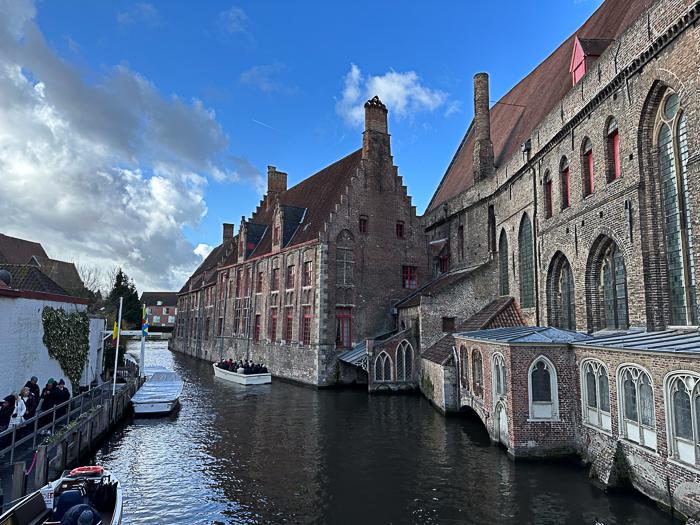
Before we went down for dinner, I scanned their menu online. They listed:
- A multi-course carnivore menu with ominous stuff like veal tartare, oxtail, and bone marrow.
- A multi-course vegetarian menu with obscure produce and grains.
- A la carte items of the above.
We arrived at 6 PM, the sole diners for the first hour. Turns out they offered only their four course meat meal, which fortunately included cooked scallops instead of raw baby cow. And our waiter got our chef to make a special exception for me by subbing monkfish for the bone-marrow.
I just shouldn’t have looked up monkfish on my phone.
Jim added the paired wines called the “driver’s sip,” which meant partially-filled glasses, though surely still enough to garner a DUI under European standards.
The four food courses actually translated into about a dozen rounds, given all the chef’s extras, with three different desserts, the first a “pre-dessert.” Each arrived in small portions, some teaspoon-sized, with innovated presentations and a wallop of flavor per millimeter.
Even the monkfish tasted delicious when I mentally blocked the Google image.
Our genteel but friendly duo of waiters wore black suits and white gloves. The younger guy rocked a pompadour that reminded Jim of Danny from the movie Grease, while the older one approximated the butler from the Sound of Music, minus the fascism.
At least 45 minutes passed between our main entree and pre-dessert. During this time most of the later-arriving guests caught up with us. We received our bill over three hours from when we first sat down, and only then upon our request, slightly rushing them according to their normal time-line. We pled jet-lag but really just battled diner fatigue.
Though spendy, dinner didn’t cost as much as Jim feared. He decided it hurt less than a single pricey seat on Broadway while still providing an entire evening of dining theatre.
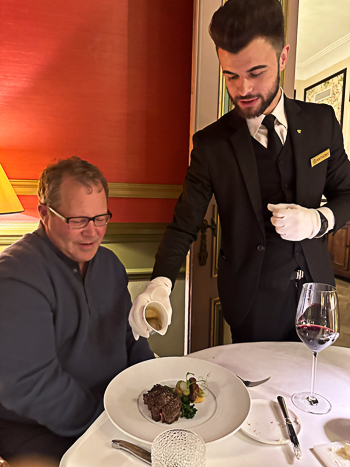
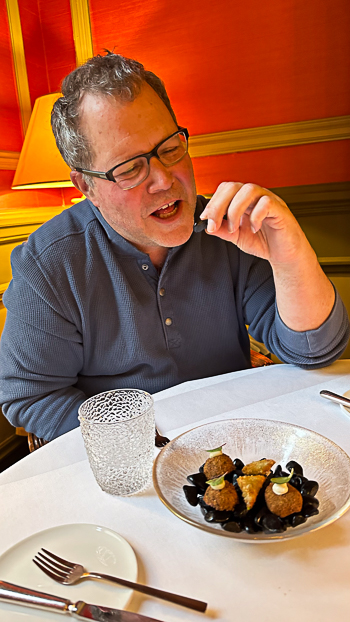
Ghent Altarpiece
This morning we hopped a short train ride to Ghent to view the famous altarpiece by Jan Van Eyck. This so-called Ghent Altarpiece has inspired the faithful, impressed the art world with its realism and revolutionary use of oils, and ignited political acts and thievery.
Protestant iconoclasts sought to destroy it in 1566, but quick-thinking priests hid the altarpiece panels safely in one of the church’s towers. Nazis looted it for Hitler’s planned art museum but the Allies and their Monuments Men later recovered it from his underground salt cave.
Today it remains in remarkable shape except for the lower left panel which is a replica, the original stolen in 1934.
These days the Cathedral keeps the altarpiece in a space behind the altar where they can:
- Protect and preserve it in a fully enclosed glass case.
- Manage the hoards of people seeing it.
- Charge money for it.
We didn’t mind.
Our guide hustled us into the room to watch the morning’s unveiling of the altarpiece. We stood in anticipation as the panels electronically opened, each scene literally unfolding, one by one. Finally the last section revealed the culmination of the masterpiece, the Lamb of God.
Bigger than we expected, we both loved the detail and the vibrant colors. I wondered what Van Eyck would think of people coming from all over the world, some 600 years later, to see his artistry. But then, his message of the Lamb of God taking away the sins of the world never ceases. It lives beyond the centuries, without end.
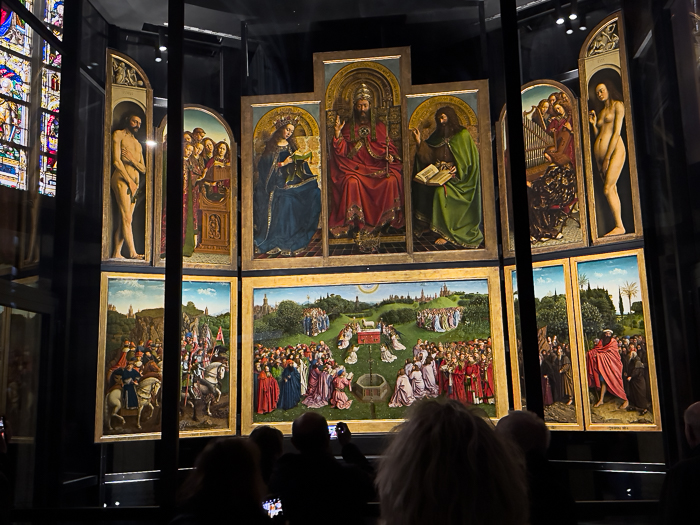
BRUSSELS
I overheard Jim talking to our son Taylor over FaceTime in our final city of Brussels. He told Tay about the European Union Parliament, the Grand Place and the 400 year old Manneken Pis fountain which receives regular changes of costumes from visiting dignitaries.
On prostate cancer awareness week, the Manneken Pis’s stream slows to a dribble. On Elvis’s birthday, he dresses like The King. We missed Brussel’s main art gallery but made time to tour the Manneken Pis Museum where we checked out the little squirt’s donated wardrobe from around the world.
With that, we’d finished with Brussels as well as our trip in general.
“Nothing happened,” Jim reported to Taylor, summarizing our 18 days in Europe. By that Jim meant that nothing catastrophic occurred as had during our past two trips to Europe.
Sometimes that kind of nothing is the very best something of all.
